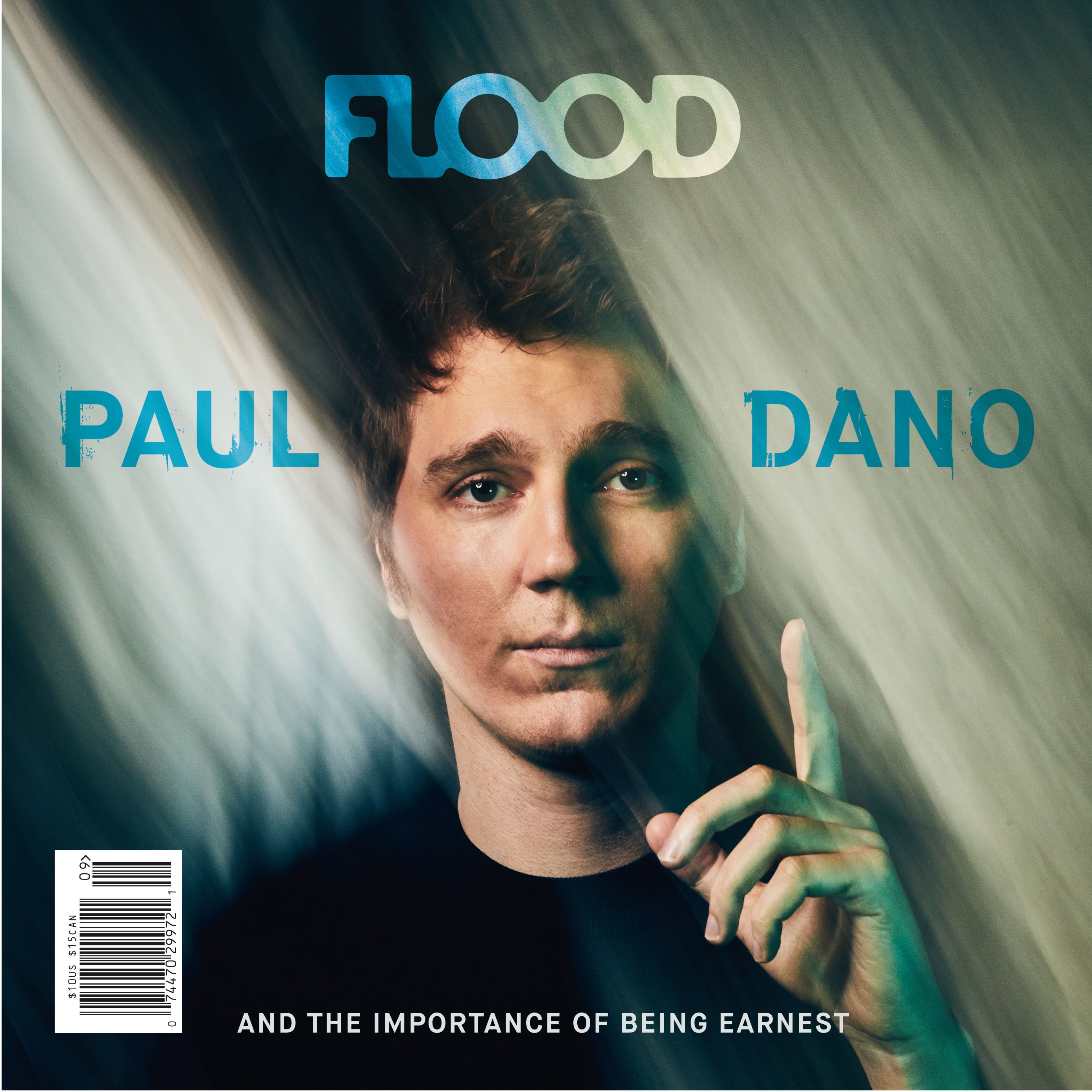Paul Dano is scared. Or, at the very least, scary is an adjective Paul Dano clings to. His eyebrows slope upward at their center in a kind of reverse Vulcan, two ramps a pair of ski jumpers could glide down into different dimensions, leaving him with a preternaturally worried look.
Some things Dano describes as scary include, but are certainly not limited to: the moment in a theater right before a film begins and the lights plunge you into anticipatory darkness; putting a child actor (notoriously risky) at the center of his directorial debut Wildlife; returning to Broadway after eight years to star alongside Ethan Hawke in a Sam Shepard play; acting with a director he knows rather than one he doesn’t (he can more easily fool the one he doesn’t); and the type of character people accuse him of playing over and over again on-screen (the other type, he tells me, is gentle).
Paul may know his stereotypes to be “gentle” and “scary,” but he doesn’t remark upon how much one informs the other. Like most artists, he isn’t wild about analyzing patterns or repetition in his work. Not only is Paul apparently pretty fearful, he is also famously adept at scaring others—as a plantation boss taunting his charges with a jaunty, slur-ridden singsong in 12 Years a Slave, a mentally deficient pedophile/murder suspect dangling a dog by its collar in Prisoners, an unctuous preacher who shrieks and connives and tongues the hand of an elderly lady in church, swearing he can cure her arthritis, in There Will Be Blood.
His on-screen presence routinely offers a weaselly, skittering threat. The first hint of autumn in the air, a lingering unease. Please understand: Dano is not an actor who will intimidate you physically—because he is the one who gets hurt, repeatedly, beaten bloody in all three of these roles. What’s most frightening is how badly you’ll want to watch him suffer. His characters deserve it, you despise them, and yet—you’ll shudder at how soft-bellied he remains. Maybe you’re the monster.
One thing Dano does not fear is playing a coward. His costars cry, pine, and bleed, but they tend to maintain a certain macho dominance over him—and frequently, full beards. Dano himself cannot grow a full beard, and when he does sport facial hair it seems tentative. In Swiss Army Man, his thick, deserted island Cast Away whiskers are fake.
Paul leans into all that. He’s willing to appear weak. Lose control. Be humiliated. The first time most people took true notice of him was bolting out of a yellow van in 2006’s Little Miss Sunshine. His uncle, played by Steve Carell, has just shattered his dreams (“you can’t fly jets if you’re color blind”), and the teen boy abandons the family vehicle and races down a hill to release a mighty “fuuuuuuuck!” breaking a months-long vow of silence before collapsing to the ground in sobs. I recall feeling surprised by the scene when I first saw it: You don’t often see a man like that. The moment has sex appeal, but it’s vulnerable, not virile.
Dano hasn’t had too many starring roles, unless you count indies (no superheroes on the docket yet), and he’s often relegated to odd or dark supporting characters without easy glory. He abandoned Hollywood entirely in 2016 for a major part in Tom Harper’s BBC miniseries War & Peace; the Tolstoy adaptation and British production required a six-month shoot in Russia and Latvia, and went on to become a huge hit in the UK. Furthermore, while not technically the star, Dano was the sole presence rivaling Daniel Day-Lewis in Paul Thomas Anderson’s punishing two-and-a-half hour There Will Be Blood. DDL had a year to prepare for his role as a wily oil tycoon, while Dano replaced another actor on short notice and had four days.
If you say Paul’s name to someone who isn’t a film nut, they probably won’t recognize it. If you cycle through one or two of his roles first, they will know immediately whom you mean. The work speaks, and haunts.
???
On the Internet, there are frequent jokes made—even articles written—about Paul Dano’s “punchable face.” He’s so good at getting beat up, voyeurs want in on the fun. The majority of would-be Paul-pummelers are perhaps responding to how odd of a face Paul’s is (odd is not an insult; it’s a face that can’t be imitated, that seems to change like a mood ring). It’s perfectly round from the front, with high cheekbones and a small dimpled chin tapering down like a lightbulb. From the side, an arrowhead nose juts out unexpectedly.
When he has a small smile, Paul reminds me of the “slightly smiling” emoji. You know the one: a circular golden head with neutral eyes and thin mouth corners turned politely skyward, used if a texter can’t commit to the frantic cheer of the grin or the smug of the smirk. “[It] may be used as a form of passive aggression or to convey the notion that ‘this is fine’ when things are, in fact, not fine,” reads the description on a dot-org called Emojipedia; Gizmodo called it the “calm smile of terror.” It’s kitten-cute, though the tight lips conceal some inner turmoil. Its partner, the same face but upside down, descends more overtly into chaos.
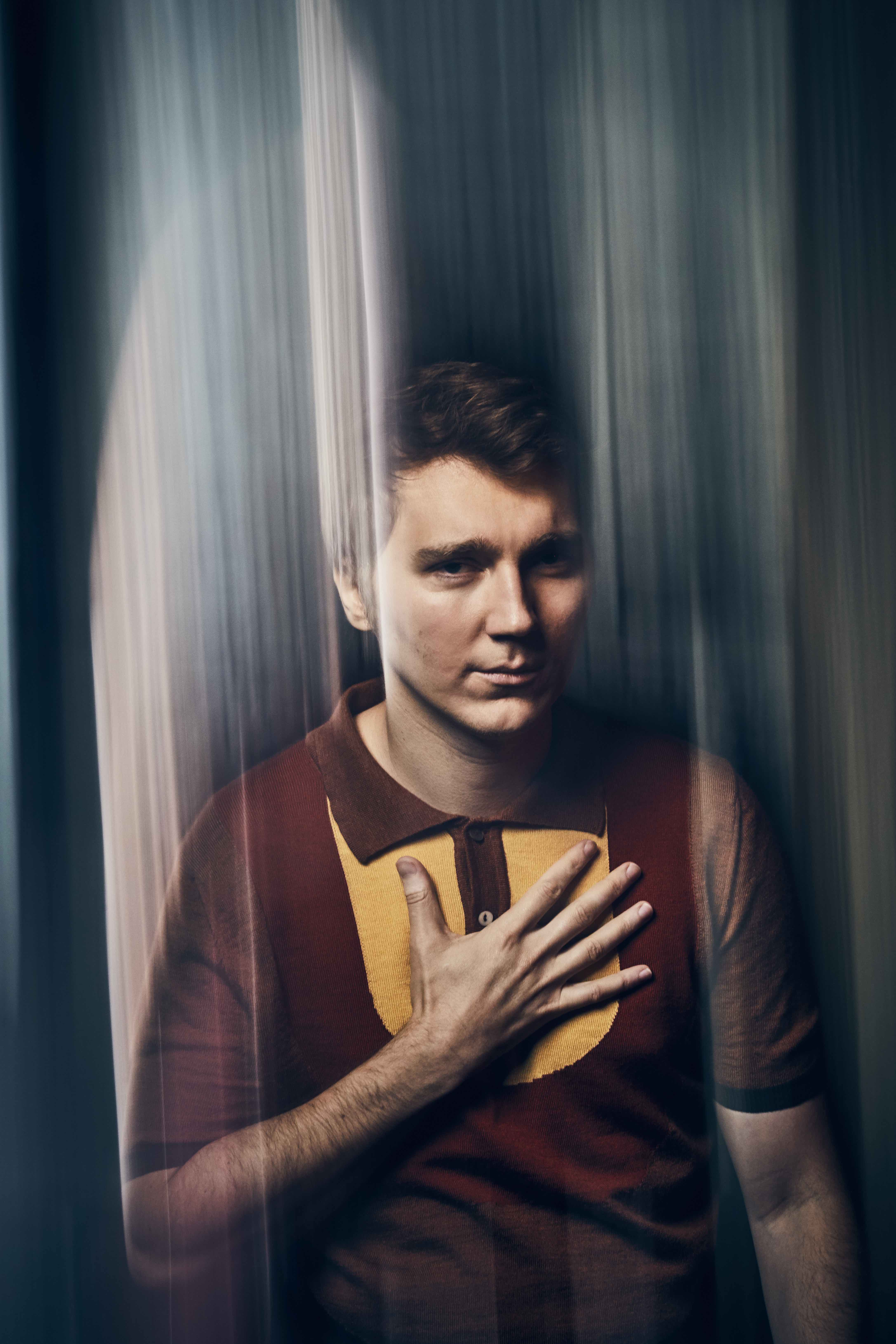 When we meet in Brooklyn, where Paul lives (and loves to take the subway), I feel no desire to punch him. Less than no desire; negative desire. He has owlish glasses, a quiet voice, and he answers questions like an academic. There are few declarative statements, and he skirts around anything too brazen, conceding that it might just be him who feels that way. Every time he talks about his first feature film as director, Wildlife—a drama based on the novel by Richard Ford and starring Carey Mulligan and Jake Gyllenhaal—he compulsively mentions his cinematographer (the talented Diego García) and editors in the same breath, eager to point to the team effort of it all. I’m guessing he’s not keen on auteur theory, either, as evidenced by how integral he considers his girlfriend of twelve years and the film’s cowriter, Zoe Kazan, to the project.
When we meet in Brooklyn, where Paul lives (and loves to take the subway), I feel no desire to punch him. Less than no desire; negative desire. He has owlish glasses, a quiet voice, and he answers questions like an academic. There are few declarative statements, and he skirts around anything too brazen, conceding that it might just be him who feels that way. Every time he talks about his first feature film as director, Wildlife—a drama based on the novel by Richard Ford and starring Carey Mulligan and Jake Gyllenhaal—he compulsively mentions his cinematographer (the talented Diego García) and editors in the same breath, eager to point to the team effort of it all. I’m guessing he’s not keen on auteur theory, either, as evidenced by how integral he considers his girlfriend of twelve years and the film’s cowriter, Zoe Kazan, to the project.
I bring up Mook, Paul’s now-defunct band. They attended South by Southwest in 2010, but Paul didn’t have sufficient time to commit to both music and film—at least not until he portrayed young Brian Wilson in the 2014 Beach Boys biopic Love & Mercy, a performance for which he sang, played piano and guitar, and was nominated for a Golden Globe.
The photographer wanders over. “Did I hear you were in a band?”
Paul practically recoils: “Well, yeah. Once. I feel very self-conscious talking about it.” I ask whether he was the frontman. “I guess so,” he says softly.
To punch such a person would be insane.
???
Three respected actors are hefting into the director’s chair this fall: First is Bradley Cooper, with his remake of musical tearjerker A Star Is Born (starring…himself); next is Jonah Hill and his tale of adolescent angst and skateboarding in Mid90s; and then, of course, Paul Dano. The first film has a pop star attached (Gaga, Our Lady of Perpetual Extra), and the second has hip distributor A24 at the helm. Hill also bros around with stars like Leo DiCaprio and Brad Pitt, and over the course of writing and directing Mid90s, he consulted no less than Spike Jonze, Ethan Coen, and Martin Scorsese.
It’s a bummer how the flash of Cooper and Hill’s films threatens to eclipse Dano’s revelatory glow. If the director got advice from any famous filmmakers in the process of making Wildlife, I didn’t hear about it. He cast Carey Mulligan to anchor the film and Jake Gyllenhaal to play her husband, the latter of whom he’d worked with on Prisoners and Okja. These are two of the most interesting actors of their generation, and Dano does them justice. Gyllenhaal proves, yet again, to be most powerful in less traditionally powerful roles—Brokeback Mountain’s lovesick Jack Twist, or the creep from Nightcrawler—while Mulligan is at long last given the opportunity to sparkle on-screen as she hasn’t since 2009’s An Education, in which she played a sixteen-year-old, though twenty-four at the time.
Now, Mulligan acts her age. She has the stately aura of a serious thespian, not a movie star. Gyllenhaal is the movie star—but in Wildlife, he purposefully recedes into the backdrop, absent for long stretches of time. They are Jeanette and Jerry, a married couple in 1960s Montana, whose relationship is dissolving faster than a tablet of Alka-Seltzer in a cup of water; their early-teenage son, Joe, is the one getting sprayed by damp fizzle.
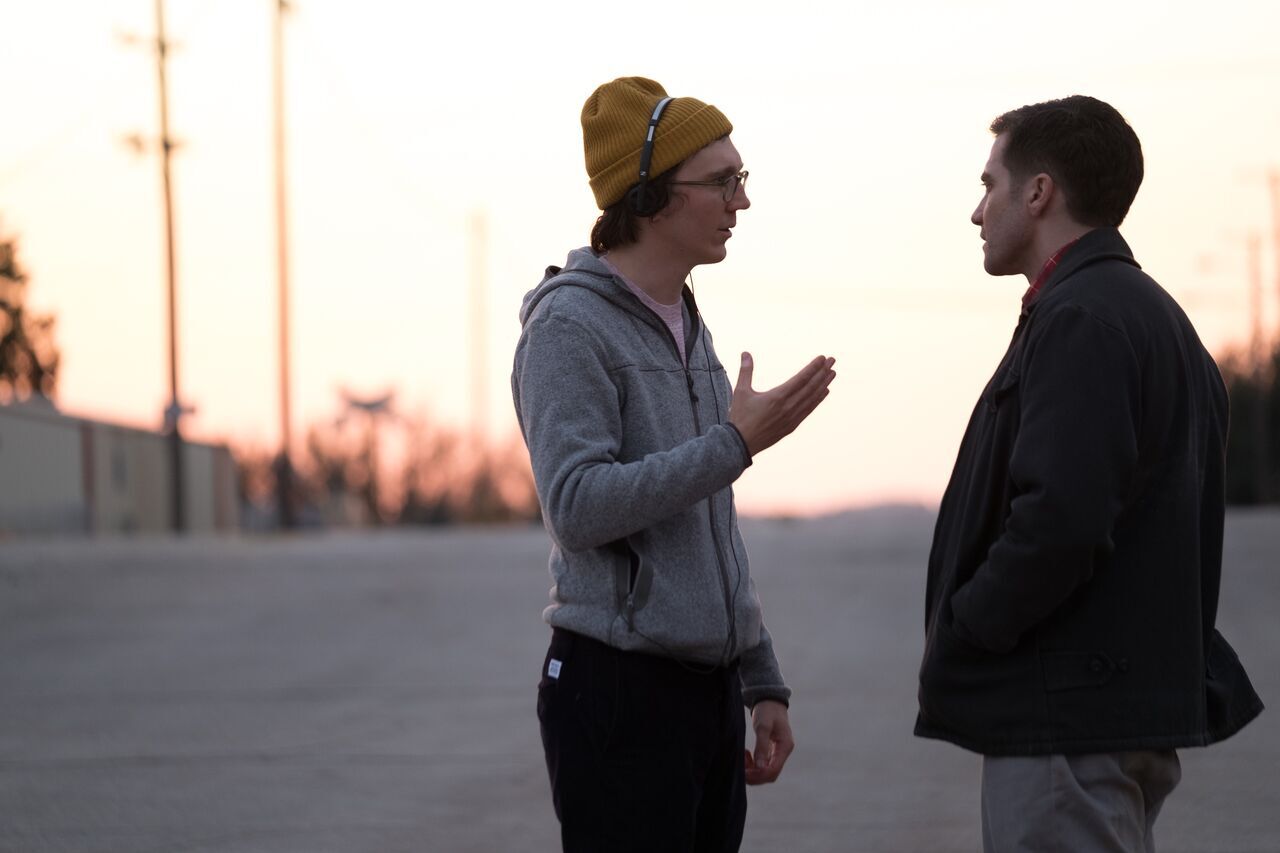
Paul Dano and Jake Gyllenhaal on the set of “Wildlife” / photo courtesy of IFC Films
A self-proclaimed Criterion Collection enthusiast, Dano has wanted to direct for a long time. He gets noticeably excited cycling through the many collaborations a director must accrue (sound design, music, costumes). “I found it so fun to be working with so many people,” he tells me. “Acting, by comparison, now feels much lonelier. A lot of your preparation is alone. A lot of your work is showing up prepared for the moment. Or maybe it just feels that way to me. I don’t know if anybody else would say it feels lonely. But compared to directing, where you’re always having to express all your thoughts to everyone… ”
Acting is a career of relative self-denial. Performers spend weeks, months, even years pretending to be people other than themselves. All that prep time and searching for motivations hidden in fiction, though, tends to exercise the empathy muscle. Paul’s seems strong, judging by the compassion with which he oversees Wildlife’s mother-father-son trio. Joe is played by impressive newcomer Ed Oxenbould, who has the kind of face that could belong to an adult, but he also looks younger than his age (and somehow resembles both Dano and Kazan a little). As an only child, he bears the burden of his parents’ problems. Joe is a sensitive kid, though most kids are like wind chimes where their parents’ slightest breezes are concerned, and many scenes—Jerry losing his job, Jeanette and Jerry bickering—take place with him observing or eavesdropping, the camera rested on his open, disbelieving face.
“Acting, by comparison, now feels much lonelier [after having directed]. A lot of your preparation is alone. A lot of your work is showing up prepared for the moment. Or maybe it just feels that way to me.”
Wildlife is one of the best divorce movies I’ve seen. When I ask Dano whether his own parents are still together (it’s a genre evaluated most fairly by people who have divorced parents), he’s hesitant to share specifics. “They are…” he says, though the way he emphasizes the second word makes it sound like a technicality, “…but they were not always. They were sort of… They have a unique relationship. They were never officially divorced, but there were times where, you know…things were different.”
One thing Wildlife gets right is how parents in conflict vent to their kids about each other. It’s having the two pillars of your life—the sun and moon—at odds. As if your right and left arm are pulling in separate directions, but you can’t properly detach from either.
The film also understands why parents complain to their kids about marital fissures, even when the kid isn’t old enough to hear it yet. They can be a parent’s source of comfort, the sole trusted ally. Adult friends don’t necessarily know how bad things have gotten, but the kid always does, having witnessed it all. Still: There’s a cruel power imbalance in a parent leaning on a child. Children are not their parents’ equals.
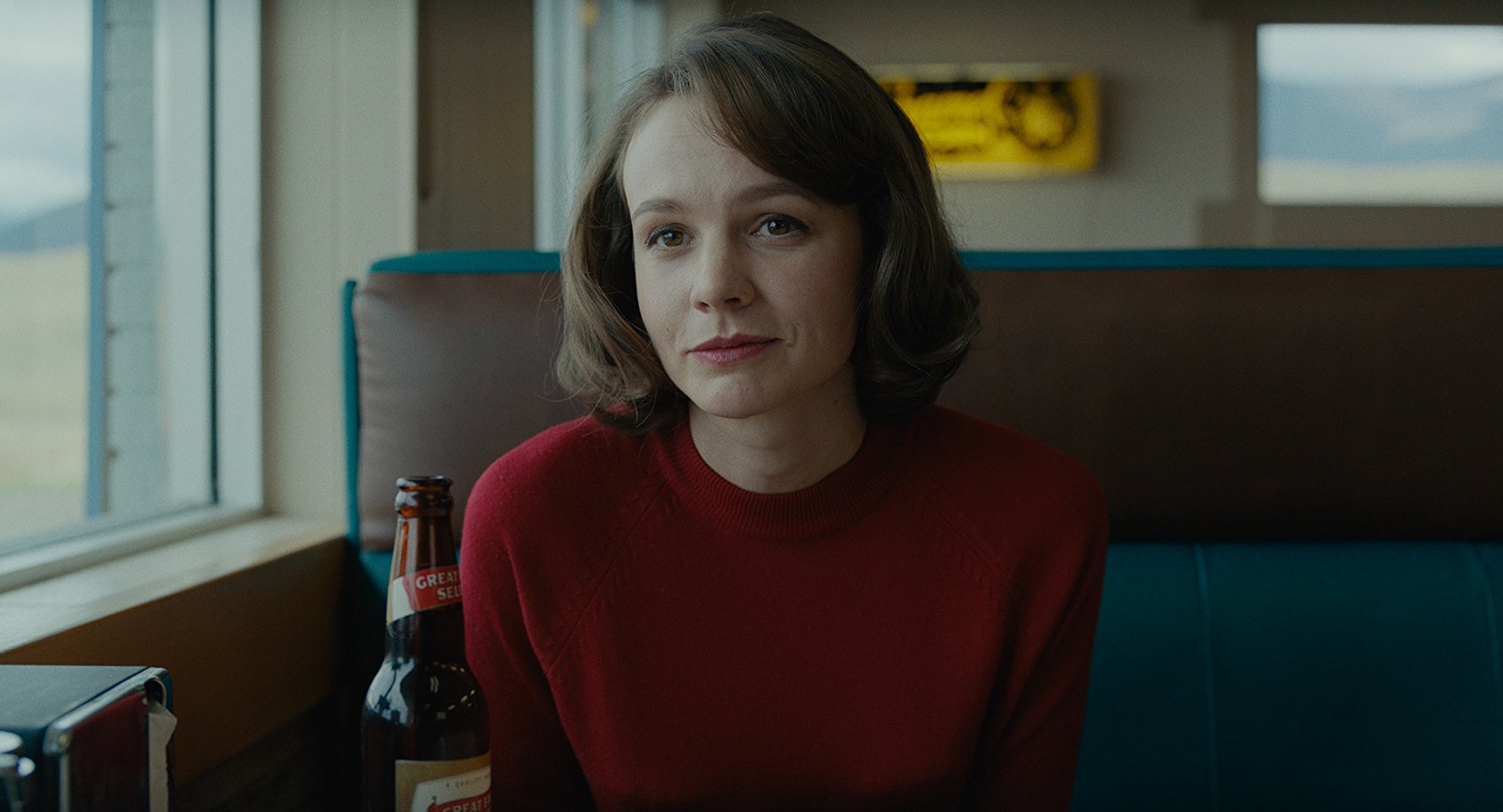
Carey Mulligan in “Wildlife” / photo by Scott Garfield, courtesy of IFC Films
This is where Mulligan excels. Both Jerry and Jeanette confide in Joe, and he does his best to convince each that the other still loves them; but Jerry refuses to work as a grocer and signs up to fight a wildfire in the mountains instead, while Jeanette is fed up with his avoidance and tendency toward needless risk. She begins a love affair with a much older, less attractive neighbor (played shamelessly by Bill Camp), and makes Joe watch.
In a lesser film, Joe would villainize the parent who knows it’s time to split—that the relationship is not healthy anymore—for breaking up his family. (That’s Jeanette.) In this film, Joe sees both sides. Clearly, so do Dano and Kazan.
“Love is what makes something painful sometimes, right?” says Dano of the story’s themes. “Something about that really moved me. That was my perspective of it… I didn’t rebel… I sort of wanted to try to help, you know—keep the ship as steady as it could be.” (Here he is referring, I suspect, to his own experiences.) “Family has some of our greatest love, but is also probably the source of some of our greatest struggle.”
Just as Dano has done on-screen, Mulligan allows herself to be unlikable as Jeanette. She’s hard, domineering, decisive, and much braver than her husband, even if he’s the one battling a forest fire. The generosity and space Dano provides his actors is the biggest indicator of his time at the camera’s other end. He lingers long and hard on his leads, and Mulligan in particular is given the rare chance to be messy. There are scenes where she just about makes your skin crawl.
https://www.youtube.com/watch?v=RVbOjP1Ziec
“We shot the film in a fairly economical way, so it allowed her enough takes where it was like, ‘You don’t have to worry—let’s go search for it, let’s play,’” he explains. “It’s like parenting. It’s all them. You’re just giving them the space to be them and be their best selves, pushing them occasionally.”
Paul recently worked with another actor/filmmaker: Ben Stiller, director of a new Showtime limited series called Escape at Dannemora, based on the true story of an upstate New York prison break and the resulting manhunt in 2015. Dano plays a convicted cop-killer who makes a miraculous bid for freedom alongside another inmate (Benicio Del Toro), abetted by an older female prison employee who is sleeping with both of them (Patricia Arquette). In episode one, Dano does his first major love scene with Arquette; well, love is a generous term for the uber-quickies they have on the clock while she’s overseeing his work in the tailor shop. Dano depicts the life-sentence-serving David Sweat with seductive insolence and a small, reddish goatee.
As a fellow director with acting cred, Paul found Stiller sympathetic. “It’s based on a true story, so he’s very meticulous with details—but with the actors, he’s very free,” Dano says of Stiller. “There were times when he was like, ‘I know that this sucks.’ There were many uncomfortable things we had to do. Especially because prison is fuckin’ bleak.”
???
Paul and Zoe Kazan, who is also an actress, wrote Wildlife together, but they did not write it at the same time; after she gave him copious notes on a first draft he was secretly quite proud of (lovingly, of course—it wasn’t even written in screenplay format), they passed it back and forth in edit mode for years. I ask whether he felt emasculated by his girlfriend tearing apart something he’d slaved over. Most guys would. “I probably felt debilitated,” he admits. “It was my first time trying to write. I definitely needed the help, though. I mean, I was asking for it.” Dano wrote by the image a lot, so Kazan brought a sense of structure to the thing, taking multiple images and turning them into one scene rather than three. In interviews, he likes to refer to her as “a proper writer.”
 The first film Paul and Zoe acted in together was Kelly Reichardt’s Meek’s Cutoff in 2010, a tale of adventure and hardship on the Oregon Trail that required a grueling desert shoot. The second was Ruby Sparks in 2012: Paul starred, Zoe wrote the screenplay, and Jonathan Dayton and Valerie Faris—the same couple who made Little Miss Sunshine—directed. The indie was marketed as a rom-com, even though it’s more of a rom-horror. (This should be a genre. One could argue for Knocked Up as a rom-horror, for instance: Two people trapped inside a compatibility-bereft relationship after an accidental pregnancy.) In Ruby Sparks, Dano plays a novelist named Calvin who’s struggling with writer’s block, and whose therapist suggests he write about a woman who loves him unconditionally to get the creative juices flowing. He does, and the woman he invents is Ruby, who then appears IRL (played by Zoe) with no idea she is Calvin’s rib.
The first film Paul and Zoe acted in together was Kelly Reichardt’s Meek’s Cutoff in 2010, a tale of adventure and hardship on the Oregon Trail that required a grueling desert shoot. The second was Ruby Sparks in 2012: Paul starred, Zoe wrote the screenplay, and Jonathan Dayton and Valerie Faris—the same couple who made Little Miss Sunshine—directed. The indie was marketed as a rom-com, even though it’s more of a rom-horror. (This should be a genre. One could argue for Knocked Up as a rom-horror, for instance: Two people trapped inside a compatibility-bereft relationship after an accidental pregnancy.) In Ruby Sparks, Dano plays a novelist named Calvin who’s struggling with writer’s block, and whose therapist suggests he write about a woman who loves him unconditionally to get the creative juices flowing. He does, and the woman he invents is Ruby, who then appears IRL (played by Zoe) with no idea she is Calvin’s rib.
Initially their bond is magical, but when Ruby begins showing signs of having a mind of her own, Calvin starts editing her to fit his whims. One particularly sinister scene involves Calvin revealing to Ruby that she’s not real, and proving it by executing his authorial control: typing commands on a typewriter (to bark like a dog, to speak in fluent French, to scream “you’re a genius” over and over), and watching as she’s forced to obey. Zoe has made it clear the film didn’t echo her and Paul’s actual relationship, but she did write it for them to play together on-screen. “I feel like even with Paul, some of the things that made me attractive to him were the things that now he finds very challenging,” she told W Magazine truthfully of the film’s relation to their lives.
“Love is what makes something painful sometimes, right?”
Dano has no social media presence to speak of, while easy-breezy Zoe has beautifully curated hers. She tweets back and forth with journalists, film critics, and other celebrities; chipper and intelligent and politically engaged. Unlike Paul, Zoe’s family is in the biz (she is Elia Kazan’s granddaughter, in case you didn’t know), but they live in New York and not LA because Paul prefers it. The two met performing in the 2007 play Things We Want, directed by Ethan Hawke, and both have delicate features and ways of speaking, equal parts fragile and earnest, two country mice living in the big city but hunkering down at home to watch foreign films. Zoe attended Yale, and has discussed the pair’s joint workaholic natures, telling The Los Angeles Times last year: “I have a partner who is very work-oriented. Sometimes we’re two hamsters on a wheel.” In a recent happy birthday post for Zoe on Twitter, Lena Dunham wrote that her friend “looks fourteen but is ninety years old inside.” Paul and Zoe, then, are a couple with old souls and fresh faces.
Dano insists he’s not as serious as he seems. But he is private, so he doesn’t show his “goofy” side in public much. (“I know a lot of actors who are like this, actually—but I’m just not somebody who likes to put myself on display.”) If you want to see the real Paul, I couldn’t tell you where to look—but I can point to the tender portrait his longtime lady paints of him on social media, a version you won’t find anywhere else.
On socials, Zoe refers to Paul as “PD.” She tweets about him sweetly and a little mockingly; the “PD” tweets aren’t frequent, but they do illuminate. She makes him out to be part Monsieur Hulot, part Larry David, but kinder; a little bumbling, unapologetically unhip, a tad crotchety. Last year, she transcribed a conversation the pair had while watching sports news: PD asked Zoe what “ICYMI” meant, and when she explained the Internet acronym, his response was incredulous. “Enough people know that?”
My favorite might be a screenshotted text exchange featuring PD on a plane, messaging Zoe that there is a cat beneath his seat. “Oh no! Your allergies!!!” Zoe texts back pityingly, to which PD sends a somber reply: “I know.” And then: “This kitten is noisy and under my seat and the plane will be circulating the air.”
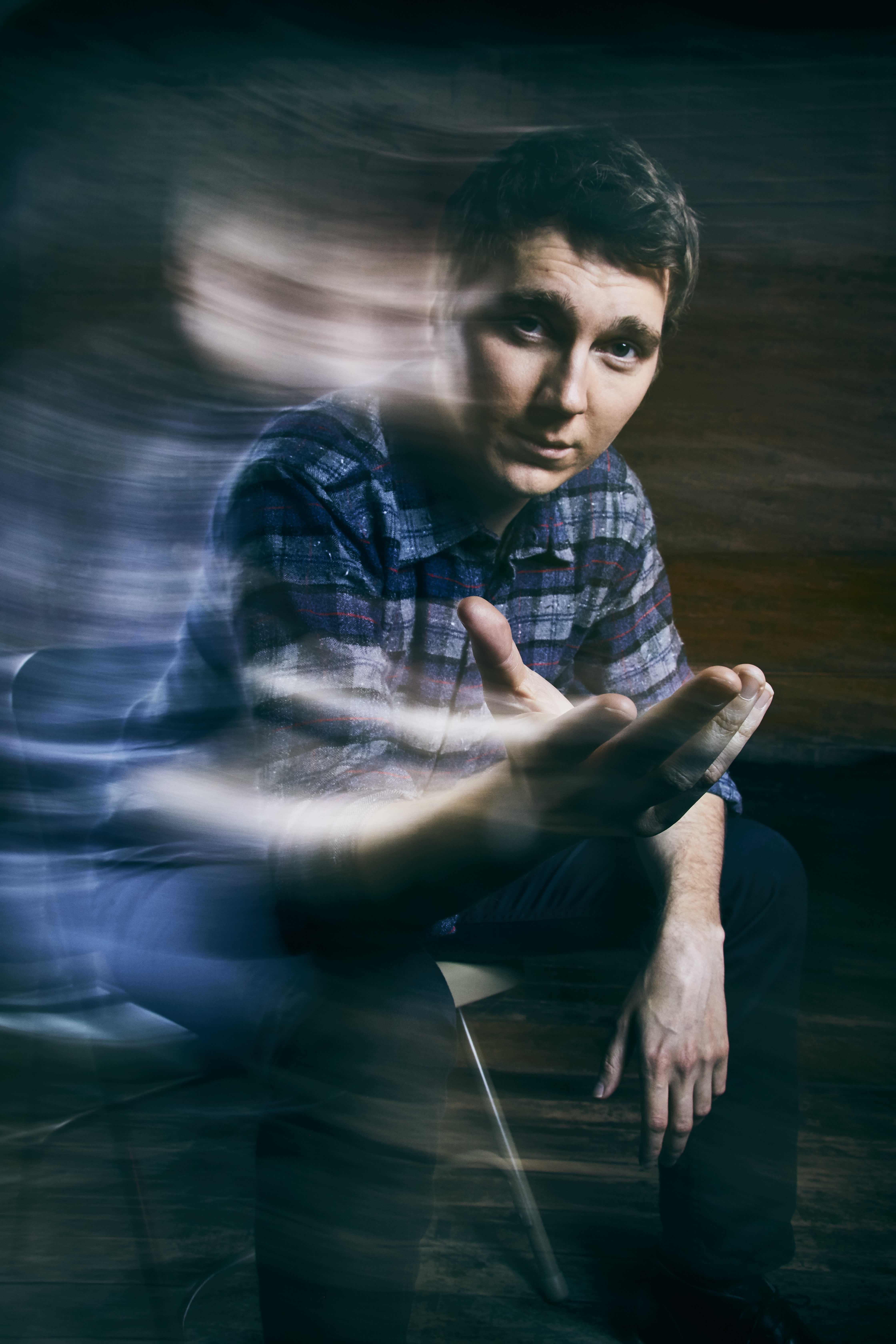 He smiles a lot when we talk about his online alter-ego. “I’m always shocked when I find out that she’s [tweeted about me],” he says. “I know that happens, but I think it happens more than I know. I’m sort of jealous. I love how active Zoe is socially and politically—that’s got great value.” I mention the Monsieur Hulot thing (he’s a cinephile, so I’m speaking his language), but when I say the tweets present him in a light the public wouldn’t otherwise be privy to, he gets really giggly and asks for clarification: “That I’m like, what? A neanderthal with technology?” (That’s precisely what Hulot is. I’m not so sure about Paul.)
He smiles a lot when we talk about his online alter-ego. “I’m always shocked when I find out that she’s [tweeted about me],” he says. “I know that happens, but I think it happens more than I know. I’m sort of jealous. I love how active Zoe is socially and politically—that’s got great value.” I mention the Monsieur Hulot thing (he’s a cinephile, so I’m speaking his language), but when I say the tweets present him in a light the public wouldn’t otherwise be privy to, he gets really giggly and asks for clarification: “That I’m like, what? A neanderthal with technology?” (That’s precisely what Hulot is. I’m not so sure about Paul.)
“I think I’m not on [social media] because, honestly, what am I going to say? I don’t need to tweet something. What am I going to say?”
Social media freaks him out because of all the negative energy, in addition to some healthier contributions. Reading the news every morning of this administration takes its toll. Twitter can exacerbate the bad stuff, as it’s a place where everyone goes to wail; if personified, a newsfeed would sound something like a billion wolves howling in agony. (Maybe a few of them would be laughing.)
“I think I’m not on it because, honestly, what am I going to say? I don’t need to tweet something. What am I going to say?” The second time, the question sounds almost helpless. I have no good answer for him.
???
Paul Dano loves all sports, but basketball especially. In middle school, he dreamt of playing in the NBA.
“I think in art, probably the most important thing is the gut part, above the intellect,” he tells me when I (snobbishly) note the possible disparity between his high intellect interests (Criterion, theater) and the more primal ones (like sports). Both athletes and actors have made focused physicality their profession: It’s about bodies and what you can do with them, but it’s also a grace under pressure, an uncanny, natural-born knack. Athletes have an assigned position on their team, like an actor does in a story—still, within those roles, there’s room to get weird.
It makes sense, too, that basketball would be Paul’s pet sport. It allows for more creativity than some of its equivalents, and there’s something more intimate about the handling of the ball. Baseball players smack it away with a bat or catch it in a glove; soccer players kick it with cleats; footballers tuck it crudely beneath their arm and sprint. But there’s a tenderness to the dribble, bare-handed, no body armor. A method of cradling the thing that’s reminiscent of Paul’s gentle side, both behind the camera and away from it. FL
This article appears in FLOOD 9. You can subscribe to the magazine here.









